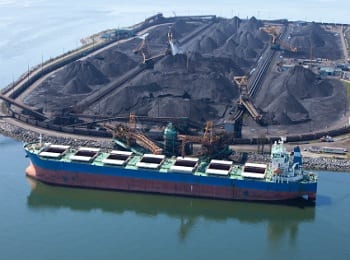The huge financial risk attached to the federal government-backed development of mega-coal mines in Queensland’s Galilee Basin has been highlighted yet again – but this time in an assessment from the state’s own Treasury department.
Documents uncovered by the North Queensland Conservation Council via Freedom of Information laws have revealed that the Queensland Treasury expressed serious concern about public money being spent the projects when no proper due diligence had been conducted by the then Newman government.

The documents essentially confirm what has been asserted, often, by many: that the Indian company behind the proposal to develop Australia’s biggest coal mining project – Adani Group – cannot find finance for the project, and does not have the ability to provide security for any investment of public money in the venture.
As IEEFA’s Tim Buckley wrote here in May, “Adani’s coal holdings in the Galilee had already become a stranded asset,” and now, with the Indian Group’s recent corporate restructure, it has effectively become “collateral damage”.
“The project is financially handicapped by lacking about $2.8 billion in financing for the first stages of construction. That figure includes backing for the coal mine itself, for related equipment and for a 150-megawatt power station to support the project. The company also needed $2.7 billion in financing for a rail line and locomotives,” Buckely wrote.
And now it seems the Queensland Treasury was onto it, too. According to a Fairfax Media report, hundreds of pages of correspondence from senior Treasury figures, including former under treasurer Mark Gray and principal commercial analyst Jason Wishart, raise concerns over Adani’s high level of debt and identify the mining giant as a “risk” because of its unclear corporate structure and use of offshore entities.
“A trail of emails between September and December (2014) shows a rising level of urgency in Treasury as officials tried to conduct a proper financial assessment of Adani while the Department of State Development, Infrastructure and Planning (DSDIP), led by Deputy Premier Jeff Seeney, pushed ahead with a proposal to assist the company,” the newspaper reports.
“Continued expansion to meet power and mine ambitions will place this financial position under increased strain,” Wishart reportedly wrote.
“Ultimately the success or failure will depend on how well the continued expansion into the Indian electricity market goes, with the Carmichael coal and infrastructure development being an Indian power market play.”
Of course, the huge risks – both economic and environmental – attached to Abbot Point have already been recognised both by local and international energy market analysts, and more than 10 global banking giants, with France’s BNP Paribas, Societe Generale, and Credit Agricole becoming the latest to rule out funding for either the development of the new mega-coal mines or of the associated port and rail facilities.
But as NQCC spokesperson Jeremy Tager has noted, the fact that the Queensland Treasury had flagged Adani’s Carmichael proposal as “an economic basket case,” increases the pressure on state and federal governments – and Australia’s Big Four banks – to do their due diligence.
Under the Newman government, he said, “it appears the Department of State Development went rogue, ignored Treasury’s calls for proper due diligence and actively excluded Treasury and Prime Minister and Cabinet from critical information, while arranging for taxpayers’ money to be invested in Adani projects.”
The current Labor Palaszczuk government has so far ruled out any financial backing of the controversial project, but otherwise has given it its blessing, despite environmental implications that earned it a top 3 spot among world’s most controversial projects of 2014, in a Reputational Risk report released in April.
According to Tager, last week’s call by the Department of State Development for tenders for dredging work at Abbot Point before approvals or even assessment had taken place suggest little has changed, from one state government to the next.
“The Queensland Premier must immediately call a halt to any moves to spend taxpayers’ money on Adani’s port, mine and rail projects – including via subsidies – and require a full and formal due diligence assessment of Adani’s capacity to undertake this development,” Tager said in a statement on Wednesday.
“There is now a window of opportunity for Premier Palaszczuk to do the right thing, avoid the mistakes of the Newman government and put the economics of Adani’s projects under the microscope.”
As noted, the Abbott government – a committed fan of all things coal – has given the project its full support, and offered plenty of “political good will”, as Fairfax Media put it, since Adani secured a 99-year lease at the connected Abbot Point Port for $1.8 billion in 2011.
According to Abbott, it is Australia’s “destiny” to bring affordable energy (read: coal) to the world – and particularly India.
While in India in last September he described it as “one of the minor miracles of our time – that Australian coal could improve the lives of 100 million Indians, and it just goes to show what good that freer trade can do for the whole world.”










